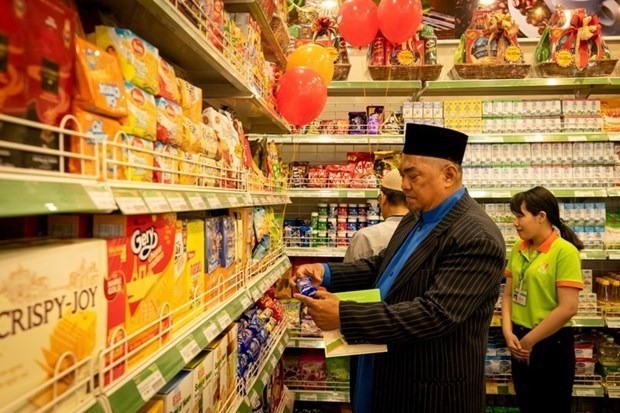With sound partnerships with Muslim-majority countries, the Halal industry will become an important field of cooperation, helping further promote Vietnam’s substantive ties with such partners and contribute to common development and prosperity, said former Deputy Foreign Minister Pham Quang Hieu.
 |
The global Halal market's value stands at US$7 trillion last year and is expected to reach about US$10 trillion by 2028. (Photo: congthuong.vn) |
Hieu, who is now Vietnamese Ambassador to Japan, made the remark during a recent interview granted to the press about the implementation of the plan on enhancing international cooperation to develop the Halal industry of Vietnam by 2030.
The Ministry of Foreign Affairs coordinated with other ministries and sectors as well as consulted domestic and international experts, Vietnam’s overseas representative agencies, localities and businesses to make the plan, which was approved by the Prime Minister on February 14.
Hieu said this is the first plan to outline national-level orientations for mobilising international resources for building and developing the Halal industry in a methodological, professional, and comprehensive manner.
It also set up a new direction for implementing economic diplomacy, tapping into the highly potential global Halal market, and creating a new impetus for sustainable economic development, especially when traditional markets of Vietnam are grappling with difficulties due to inflation and economic recession.
In that context, diversifying export markets by exploring new ones is considered the “golden key” to bolstering export and contributing more to national economic development.Besides, the plan implementation will help further intensify Vietnam’s relations with large Halal product consuming countries such as Indonesia, Malaysia, and Saudi Arabia, thereby contributing to raising the role and stature of Vietnam and its enterprises in the global Halal market, the official noted.
He went on to say that to Vietnam, opportunities in the global Halal market are considerable as this market had some 1.94 billion people in 2022, or nearly one-fourth of the world population and still growing. Its value stood at $7 trillion last year and is expected to reach about $10 trillion by 2028.
Halal products are consumed worldwide, from Muslim to non-Muslim countries. Spending on those products has also been on the rise because they meet many criteria for food safety, quality, and environmental protection.
In addition, most of the biggest Halal product manufacturing countries are non-Muslim. A number of Halal product consuming or exporting countries such as the Republic of Korea, Saudi Arabia, Indonesia, and Malaysia have also shown interest in and wish to boost cooperation with Vietnam in developing the Hala industry here.
Vietnam also holds numerous ideal conditions for developing this industry, including a favourable geographical location, strengths in agriculture, food, tourism, and services, along with intensive and extensive economic integration into the world through its participation in many leading regional economic connections, including new-generation free trade agreements.
The Government has also paid great attention to assisting enterprises to explore and effectively engage in the global Halal market, according to Mr. Hieu.
The official added by joining the global Halal market, Vietnamese enterprises will have a chance to develop tourism, bolster the overseas shipment of the products they are strong in, and attract foreign investment to the country.
They can also improve their capacity, competitiveness, and human resources quality while further equipping themselves with production and transportation technologies meeting Halal standards.
























